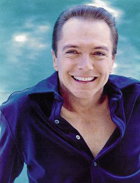
David Cassidy in the News
Partridges Are History For Cassidy - Cassidy Overcomes Old Image
November 10, 1990
By Renee Tawalos
Angeles Daily News
LOS ANGELES ó David Cassidy is running late, and what Life magazine in 1971 called his ''sweet-faced Paul McCartney charm'' is oozing in apology to a reporter for his 1 1/2-hour delay.
He hates being late - especially for an appointment to talk about his better-late-than-never album David Cassidy, nearly two decades after The Partridge Family TV show caused a sensation that eventually drove him to therapy for 3 1/2 years. Life after Keith Partridge had Cassidy raising horses, working in theater and recording in Europe but largely dropping out of sight.
''I didn't become a tragic figure,'' said Cassidy, 40. ''I didn't end up playing in some lounge somewhere, being a sad oldies act, you know? I finished and left it on the top.
''Probably the only person that really means anything to is me. When that thing was over, I didn't try to spin it off and just go out and work and sell myself down the river, which is why I have a career today.''
Cassidy (who will appear tonight at 10:15 during the Light Up Orlando street festival) hopes his new album will open the minds of a skeptical public that mostly pegs him to '70s relics as unhip in the '90s as pukka shells and bell-bottom jeans. In the public's mind, he's still a long-haired teen idol, the subject of fan magazine pieces with such tantalizing titles as ''David: How to Turn Him On - By the Girls Who Have.''
The madness peaked at a 1974 Cassidy concert in Great Britain, when a 14-year-old fan died of a heart attack amid the hysteria.
The myth lives on.
In an article last month, a Washington Times reporter described his eyes as ''dreamy blue.'' And when his new album came out in October, faithful fans were waiting outside a Tower Records store in New York City.
''Two or three people were standing there, wanting it,'' said store assistant Maria Wibbels in disbelief. ''That doesn't happen a lot. I mean, they did that for Prince, but ...''
Hot industry producers worked on David Cassidy, including Billy Joel's producer, Phil Ramone, and Talking Heads' producer, Eric (E.T.) Thorngren. Ramone called him ''a very thorough professional, a fine musician and songwriter.''
Cassidy recently sang on Arsenio Hall's show. Talked to Rolling Stone. Got airplay on MTV.
He is serious, articulate and thoughtful, as though he has had a lot of time to work things out in his mind. He is slightly built and wears all black a lot these days.
The famous shaggy hair still spills past his shoulders but is thinning and has a touch of gray. The engaging smile is the same. In publicity photos, the lines in his face are airbrushed out. It's hard to believe people still recognize him, but they do.
Every day, people come up to him and say, ''Man, can I just tell you what you've meant to me?''
Cassidy calls himself ''blessed'' to have that kind of fame. Now he wants people to see him outside the Partridge persona as a guy who wants to play real rock 'n' roll.
''I was really naive enough to think people won't assume the music I'm playing on the show and that light, fluffy sort of airhead character was really me,'' Cassidy said.
He was singing ''C'mon, Get Happy'' on television and then rocking at home to music at the opposite end of the spectrum with Jimi Hendrix, the Beatles and English blues records.
It took a long time for him to conquer the demon inside him that was Keith Partridge, and he wants the world to know he has done it.
Cassidy's ''Boulevard of Broken Dreams'' from the new album is about himself.
''It's about the jive that corrupts your sense of dignity, your sense of integrity and your soul if you allow it and buy into how fabulous you are on the way up. It's kind of like the old saying 'Nobody loves you when you're down and out.' ''
The ballad is haunting: Fallen far from the glory.
Remembered as another sad story.
Surrendered what's left of a hero that was . . .
When we last left this teeny-bopper hero in 1974, The Partridge Family had folded after four seasons and millions of coloring-book, lunch-box and doll sales. Cassidy, as Keith Partridge, sang lead on ''I Think I Love You,'' which sold more than 6 million copies around the world.
Girls camped on his doorstep. They bought ''David Cassidy Lover's Kits.'' He posed nude for Rolling Stone.
The hysteria was driving him crazy, so he left the business to raise thoroughbred racehorses. He also recorded solo albums that didn't take off, worked in regional theater, starred on Broadway for six months in Joseph and the Amazing Technicolor Dreamcoat and received an Emmy nomination for the television film A Chance to Live.
Cassidy got married and divorced twice - and couldn't find his niche.
''I pretty much emotionally hit rock bottom,'' he said. ''I went into analysis for 3 1/2 years. I went three times a week, and it really helped me. I made a whole metamorphosis. I stopped caring so much about what other people think of you. . . . You just have to do what you like for yourself.''
He returned to music, his first love, and was writing songs for Cher and Asia when two Los Angeles disc jockeys called him on his birthday last year. They invited him to play some of his demonstration records, and three songs later, three record companies had made offers.
He's ready, but this time around won't be like the old days. ''The reason I'm back is not to try to re-create that,'' Cassidy said, emphasizing that with disdain, ''but to try to create today.''
Cassidy is not closing the door on his past. He's thinking about playing some old hits when he tours for the album. And on one of his songs, a funky rocker, he tosses in a teasing, pleasing ''I Think I Love You'' line in mid-verse.But this time around, he sings those words knowing who he is, and who he's not.
